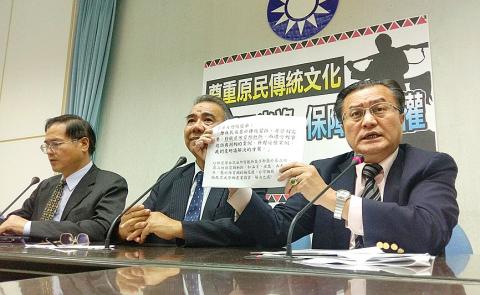The Chinese Nationalist Party (KMT) yesterday voiced its support for a Bunun hunter who was convicted on charges of poaching and illegal possession of firearms, calling on President Tsai Ing-wen (蔡英文) to respect her apology made to the nation’s Aboriginal communities, while KMT Central Policy Committee director Alex Tsai (蔡正元) called the Democratic Progressive Party (DPP) “fake Taiwanese” for persecuting Aborigines.
KMT officials and KMT Aboriginal lawmakers held separate news conferences to voice criticism of the government’s failure to live up to Tsai’s promise to safeguard Aborigines’ rights, citing the case of Bunun hunter Tama Talum, also known by his Chinese name, Wang Guang-lu (王光祿), who was found guilty of violating the Controlling Guns, Ammunition and Knives Act (槍砲彈藥刀械管制條例) and the Wildlife Conservation Act (野生動物保育法) and sentenced to three-and-a-half years in prison in October last year.
Tama and his lawyers have argued that he is entitled to hunt and practice traditional Bunun culture under the Indigenous Peoples Basic Act (原住民基本法), and Prosecutor-General Yen Ta-ho (顏大和) filed an extraordinary appeal on his behalf in December last year.

Photo: Fang Pin-chao, Taipei Times
The Supreme Court on Tuesday began to hear the appeal.
KMT caucus convener Sufin Siluko (廖國棟), an Amis, said the possession of self-made hunting rifles by Aborigines is an issue that concerns Aboriginal communities’ collective cultural rights.
The guilty verdict was based on Tama’s use of a rifle that was not of the less-sophisticated type usually used by Aborigines for hunting and ceremonies.
Aborigines cannot be asked to “use a 19th century rifle while living a modern life,” Sufin said.
KMT Legislator Yosi Takun (孔文吉), a Sediq, asked why Aborigines “are required to start fires with a bow drill when there are lighters?”
KMT Culture and Communications Committee deputy director Hu Wen-chi (胡文琦) called on the Supreme Court to be lenient in reviewing the appeal, as different sets of values might be in conflict.
KMT headquarters has asked its caucus to submit amendment proposals to ensure Aborigines’ rights, Hu said, adding that the government has only paid lip service to Aboriginal communities, as “no concrete plans or agenda have been made by the DPP central and local governments to advance Aboriginal transitional justice.”
Han Chinese immigrants and their descendants have “lived in Taiwan since the 17th century and referred to themselves as ‘Taiwanese ... [and have caused] a near extinction of wildlife,” Alex Tsai said on Facebook. “These ‘Taiwanese’ have no right to boss Aborigines around.”
“The DPP is using the law to persecute Aborigines, and these fake ‘Taiwanese’ will not be forgiven by God,” he added.

Taiwan would welcome the return of Honduras as a diplomatic ally if its next president decides to make such a move, Minister of Foreign Affairs Lin Chia-lung (林佳龍) said yesterday. “Of course, we would welcome Honduras if they want to restore diplomatic ties with Taiwan after their elections,” Lin said at a meeting of the legislature’s Foreign Affairs and National Defense Committee, when asked to comment on statements made by two of the three Honduran presidential candidates during the presidential campaign in the Central American country. Taiwan is paying close attention to the region as a whole in the wake of a

President William Lai (賴清德) has appointed former vice president Chen Chien-jen (陳建仁) to attend the late Pope Francis’ funeral at the Vatican City on Saturday on his behalf, the Ministry of Foreign Affairs said today. The Holy See announced Francis’ funeral would take place on Saturday at 10am in St Peter’s Square. The ministry expressed condolences over Francis’ passing and said that Chen would represent Taiwan at the funeral and offer condolences in person. Taiwan and the Vatican have a long-standing and close diplomatic relationship, the ministry said. Both sides agreed to have Chen represent Taiwan at the funeral, given his Catholic identity and

Lawmakers from the Democratic Progressive Party (DPP) yesterday established a friendship group with their counterparts in Ukraine to promote parliamentary exchanges between the two countries. A ceremony in Taipei for the Taiwan-Ukraine Parliamentary Friendship Association, initiated by DPP Legislator Chen Kuan-ting (陳冠廷), was attended by lawmakers and officials, including Deputy Minister of Foreign Affairs Francois Wu (吳志中) and European Economic and Trade Office in Taiwan Director Lutz Gullner. The increasingly dire situation in Ukraine is a global concern, and Taiwan cannot turn its back when the latter is in need of help, as the two countries share many common values and interests,

Chinese Nationalist Party (KMT) Chairman Eric Chu (朱立倫), spokeswoman Yang Chih-yu (楊智伃) and Legislator Hsieh Lung-chieh (謝龍介) would be summoned by police for questioning for leading an illegal assembly on Thursday evening last week, Minister of the Interior Liu Shyh-fang (劉世芳) said today. The three KMT officials led an assembly outside the Taipei City Prosecutors’ Office, a restricted area where public assembly is not allowed, protesting the questioning of several KMT staff and searches of KMT headquarters and offices in a recall petition forgery case. Chu, Yang and Hsieh are all suspected of contravening the Assembly and Parade Act (集會遊行法) by holding